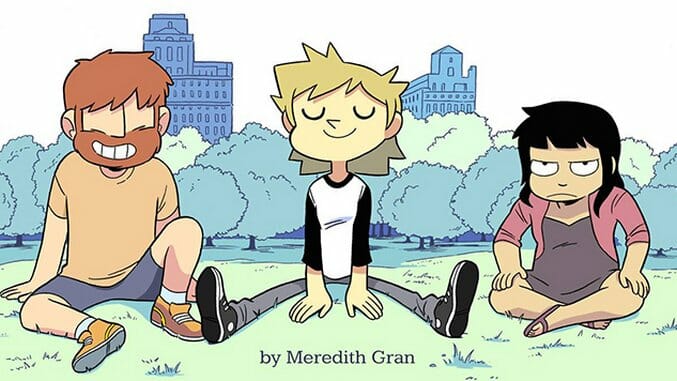Revisiting the Quarter-Life Crisis Epiphany of Octopus Pie with Meredith Gran

Meredith Gran’s long-running webcomic, Octopus Pie, follows the lives of Eve and Hanna, two friends and roommates living in Brooklyn. After nearly a decade of self-publishing online, Gran signed a deal with Image Comics to bring the beloved project to print. The first compendium, out next week, tells the story of Eve and Hanna’s initial meeting and how they came to live together. The pair’s opening misadventures cover everything from health food follies to figure skating to a heated match of Laser Tag—all conveyed with Gran’s fondness for deadpan, observational humor. Paste talked with Gran about the comic’s origins, the process of revisiting her earliest work, and her evolution as a writer and artist over the years.
![]()
Paste: What first prompted the idea for Octopus Pie? And how have you been able to tell so many stories in this world over the years?
Meredith Gran: I started things very loosely, with the character concepts and practically no story. And that’s probably the reason it endures! The stories accommodate the characters, and the characters reflect the changes in my own life.
Paste: In your introduction to this volume, you talk about returning to the point of view of your early 20s by revisiting the earlier comics collected here. Was there anything you uncovered that surprised you?
Gran: There’s simultaneously a great heaviness and lightness to Eve’s interactions. One moment she’ll obsess about a date all day long, and cry to her friends when it goes wrong. The next moment she’ll completely forget what her ex put her through and get back with him. Her career trajectory is hopeless and soul-sucking, but she treats it like a mild annoyance. There’s no fallout for her long-term decisions—just day-to-day, overblown disasters. I reread these and thought, Yeah, that’s how it felt, alright.

Octopus Pie Interior Art by Meredith Gran
Paste: Some of the humor in Octopus Pie is observational; other moments, like in the arc where Eve ends up with a bird on her shoulder, have a more absurdist bent. What, for you, makes for the most resonant humor?
Gran: I think long-term, the observational humor sticks with people. I love hearing a well-observed joke and finding context for it in my own life later on. Like a tiny puzzle piece for my brain! But lots of readers love the early absurdist stuff. I think the latter is easiest to quote and share out of context. If comics are part of your social experience, I think you gravitate towards that.
Paste: For much of the book’s first half, the art is very stylized and cartoonish, and then there’s a sequence of Eve figure skating with incredible grace. Would you say that that storyline marked a shift in the way that you were drawing the comic?
Gran: I guess you could say that! Everything got a little more three-dimensional. Up until that point, Hanna mostly regarded Eve with bored amusement. The thought of her doing something beautiful in a way that upset Hanna was funny to me. But the idea that Hanna would unquestionably go to bat for Eve was new, and it was something more substantial to build on.
-

-

-

-

-

-

-

-

-

-

-

-

-

-

-

-

-

-

-

-

-

-

-

-

-

-

-

-

-

-

-

-

-

-

-

-

-

-

-

-












































